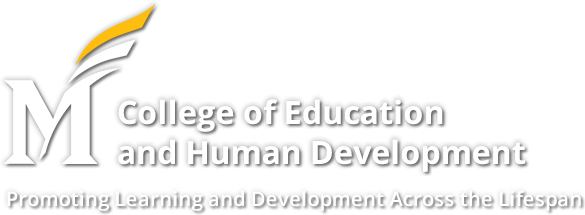College of Education and Human Development
How Do You Spell Mnemonics? Try Scruggs-Mastropieri
April 22, 2014
Last week the Division for Learning Disabilities of the Council for Exceptional Children hosted a tribute for Mason's Tom Scruggs and Margo Mastropieri.
The article below was written by June Behrmann and originally appeared on the AIM-VA blog.
* * *
It was a grand farewell in a hotel ballroom in Philadelphia last week when the Division for Learning Disabilities of the Council for Exceptional Children (CEC) hosted a 2014 tribute by researchers, professors, advisors, students, colleagues, and friends of award-winning Tom Scruggs and Margo Mastropieri from the College of Education and Human Development at George Mason University.

Mason's award-winning Tom Scruggs and Margo Mastropieri received a grand farewell in a hotel ballroom in Philadelphia last week at a tribute by researchers, professors, advisors, students, colleagues, and friends.
Maybe you now use or hope to use their proven strategies to improve your instruction in these areas of their specialization:
- Learning and memory
- Cognitive strategies
- Literacy strategies
- Inclusion strategies for students with disabilities and their peers
- Science education for students with and without disabilities
- Social studies education for students with and without disabilities
- Quantitative and qualitative research synthesis
- Learning and behavioral disorders
At the event, Professors Doug Fuchs (Vanderbilt University), John Wills Lloyd (University of Virginia), and former doctoral student Kim McDuffie-Landrum (University of Louisville) gave high praise. I’ll do what bloggers like to do—direct readers to a Scruggs and Mastropieri area of focus that fast tracks their research into your practice. A favorite strategy is mnemonics that helps students recall information, lists, characteristics, categories, steps, parts, phases, etc.
10 sources to help you use mnemonics successfully in your classroom:
- Enhancing School Success with Mnemonic Strategies
 from LD Online
from LD Online - A Focus on Mnemonic Instruction
 from (CEC’s LD, research divisions)
from (CEC’s LD, research divisions) - Mnemonics
 from the English Teachers Network
from the English Teachers Network - Cardinal Direction Mnemonics with Third Graders
 from Instructables.com
from Instructables.com - Pictorial Mnemonics x Sound Contrasting = More Effective English Teaching
 from Science Daily
from Science Daily - Using Mnemonics to Teach Academic Skills
 from National Secondary Transition Technical Assistance Center
from National Secondary Transition Technical Assistance Center - Mnemonic Devices
 from Pinterest
from Pinterest - How Can I Remember: Use Helpful Mnemonic Devices
 from BrightHub Education
from BrightHub Education - You Must Remember This: Teaching with Mnemonics
 from Education World
from Education World
About CEHD
George Mason University's College of Education and Human Development (CEHD) includes two schools: the Graduate School of Education, one of the largest teacher preparation and education schools in Virginia, and the School of Recreation, Health, and Tourism. CEHD offers a comprehensive range of degrees, certificates, courses, and licensure programs on campus, online, and on site. The college is distinguished by faculty who encourage new ways of thinking and pioneering research supported by more than $75 million in funding over the past five years.
For additional information:
- CEHD Communications: cehdnews@gmu.edu
- Graduate School of Education: gse.gmu.edu
- Division of Special Education and disAbility Research: gse.gmu.edu/special-education
Follow CEHD on Facebook at www.facebook.com/MasonCEHD or Twitter at @MasonCEHD.
